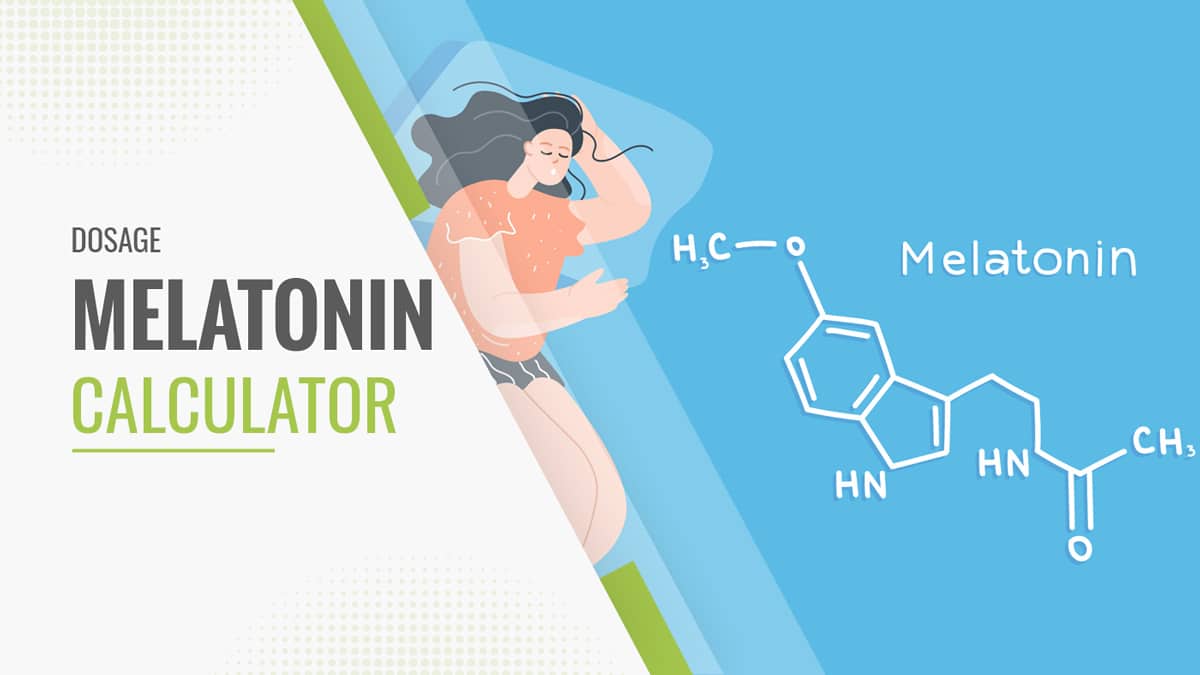Of all the things you can do for your health, sleep is arguably the most important. Sleep is when your body and brain go into repair mode, and many physiological processes occur when you’re pushing out the zzzs.
Sleep also plays a critical role in muscle building and fat burning, and not getting enough can hurt your gains.
It’s generally accepted that most adults need 7-9 hours of sleep per night. However, that’s often easier said than done.
Stress, traveling, overstimulation, light pollution, and poor sleep hygiene mean that many people are forced to get by on less sleep. Some people are just “bad sleepers” and find it hard to go or stay asleep.
Melatonin is a natural over-the-counter (OCT) sleep aid that can help make it easier to fall and stay asleep. Most melatonin products come with dosing instructions, but the amount of melatonin you actually need depends on your needs and circumstances.
Use our melatonin dosage calculator to determine how much melatonin you should use.
Melatonin Dosage Calculator
Results:
Dosage: daily
What is The Melatonin Dosage Calculator?
Melatonin is a hormone produced naturally by your body. You make more during the evening and less during the day. Melatonin production is controlled by your exposure to light. These melatonin fluctuations are called the circadian rhythm and help regulate your natural sleep/wake cycle.
Stress, artificial lights, and overstimulation can lower your melatonin levels, which makes it harder to get to get to sleep. In contrast, higher melatonin levels tell your body it’s time to relax so that sleep comes more easily (1).
Melatonin supplements are widely available, considered safe for adults, and suitable for short and long-term use (2). They artificially raise your melatonin levels and have been shown to have a positive effect on sleep by helping you fall asleep quicker and stay asleep for longer.
Most melatonin supplement users experience better sleep using a dose of 3-10 milligrams per night, taken 15-30 minutes before bedtime.
However, 3-10 milligrams is a very broad prescription. In actuality, the amount of melatonin you need depends on several variables, such as the cause of your sleeplessness, other medications you may be taking, and the type of melatonin supplement you’re using.
Our melatonin calculator allows you to customize your melatonin dosage according to your circumstances and needs. This will ensure that you aren’t taking too little or too much of this popular sleep aid.
Related: Calories Burned While Sleeping Calculator
How to Use the Melatonin Dosage Calculator
Our melatonin dosage calculator is very straightforward to use. Just follow these step-by-step instructions to discover how much melatonin you should take to optimize sleep.
- Firstly, select why you are using melatonin. Your options are Trouble Falling Asleep, Jetlag (Eastbound – US to Europe), Jetlag (Westbound – Europe to US), Insomnia in Blind People, Insomnia Caused by Beta-Blockers, and Endometriosis.
- Select the type of melatonin supplement you’ll be using. Your options are Tablets/Capsules, Liquid, Spray, or Strips.
- Next, select the duration of your melatonin therapy. Your choices are Days, Weeks, Months, Years, and combinations of these units.
- Finally, select how long you want to continue using melatonin.
- Hit “calculate” and read off your results in the box below.
Interpreting your Results
After hitting “calculate,” you will receive the following results:
- Your optimal daily melatonin dose in milligrams (mg).
- How many tablets/sprays/strips you need to buy so you have enough melatonin for the specified duration.
For example, if you have trouble getting to sleep, plan on using melatonin tablets, and want a one-month supply, your results would be:
- 5mg daily
- Anywhere from 76 x 1mg to 8 x 10mg melatonin tablets/capsules to last 30 days
Depending on the dose size available, you may need to use fractional doses to achieve the desired daily dose, e.g., halves or quarters.
How to Use Melatonin for Optimal Results
Now you know how much melatonin to take according to your needs. However, for best results, you should take melatonin at the right time of the day and for the correct duration.
Use the following recommendations in conjunction with your results:
- Trouble falling asleep: Take your dose one hour before going to sleep.
- Jetlag (eastbound travel): Take melatonin for two days before the flight, at around 7pm. Continue taking melatonin for 4 days after arrival, shortly before bed.
- Jetlag (westbound travel): Take melatonin for 4 days after arrival, shortly before bed.
- Insomnia in blind people: Take melatonin at around 9-10pm.
- Insomnia caused by beta-blockers: Take your recommended melatonin dose for up to four weeks one hour before going to sleep.
- Endometriosis: Take the recommended melatonin dose for up to eight weeks.
Note: These are general recommendations and are not meant to replace professional medical advice.
How to Improve Your Sleep
While melatonin is an effective sleep aid, there may be other factors that are preventing you from sleeping or making it harder for you to stay asleep. Take the following steps to increase your chances of getting a great night’s sleep. Combing these actions with melatonin may help make insomnia a thing of the past!

Go to bed at the same time each night
Reintroducing bedtime helps train your body to relax and expect to go to sleep. Work back 7-9 hours from when you get up – that’s your new bedtime. Go to bed at the same time every night, including on weekends.
Dim the lights an hour or two before bedtime
Bright lights suppress melatonin and promote wakefulness. In contrast, dim lights naturally increase melatonin production, telling your body it’s time for sleep. So dim the lights as you relax before going to sleep and avoid exposure to bright light on your way to bed.
Get a comfy bed and supportive pillows
Getting the recommended 7-9 hours of sleep per night means spending around a third of your life in bed. Unfortunately, the odds of getting a good night’s sleep are pretty low if you can’t get comfortable.
Most mattresses need replacing every 5-10 years. While this might be an expense you’d rather avoid, it’s one of the most important things you can do for a good night’s sleep. Pillows are also crucial for sleeping comfortably.
Minimize screen time
The screen on your phone, tablet, laptop, and TV emits bright lights that can put the brakes on melatonin production, making it harder to get to sleep. Many devices have screen dimmers to prevent this problem. Engage this feature if you have it. Better yet, put your devices away in the lead-up to bedtime to avoid disrupting melatonin production.
Lay off the caffeine
Caffeine is a potent stimulant that can stop you from sleeping many hours after ingestion. Make sure your body is caffeine-free by not drinking coffee, black or green tea, cola, caffeinated sports drinks, or pre-workouts during the late afternoon. Also, watch out for hidden caffeine, such as in chocolate and some cold medicines.
Avoid intense late-night exercise
A tiring nighttime workout can leave you revved up and unable to sleep. In contrast, gentle exercises, such as a walk, yoga, or stretching, are a much better nighttime workout that will enhance rather than hinder sleep.
Eat some carbs
Assuming your diet permits it, consuming slow-releasing carbs an hour or two before bedtime increases serotonin and readies your body for sleep. Serotonin is a neurotransmitter linked to relaxation and sleep. Good choices include wholegrain crackers, cereal, fruit, and dairy foods, such as plain Greek yogurt.
Try the 4-7-8 breathing method
This breathing exercise helps relax your mind and reduces the oxygen level in your blood, making you drowsy. This is the perfect combination for getting off to sleep. Do the following breathing exercise once you are in bed. Turn the lights off, so you don’t have to rouse yourself once you start to fall asleep.
Inhale through your nose for a slow count of four, hold your breath for seven counts, and then exhale fully for eight counts. Keep running through this cycle until you fall asleep.
Use a white noise generator
Sounds like noisy neighbors, traffic, and barking dogs often make it hard to sleep or can wake you up.
White noise generators produce a layer of low-level sound that drowns out the sounds that can ruin your sleep. Some make static noise, while others sound like the wind or waves breaking on the shore. You can also use a fan as a white noise generator.
Alternatively, you could wear earplugs to block out noise, but make sure you can still hear your alarm clock!
Melatonin Dosage FAQs
Do you have a question about melatonin or sleep in general? Rest easy – we’ve got the answers!
Is melatonin safe?
Current research indicates that melatonin is generally regarded as safe and non-addictive for adults (1). However, in some cases, it can have unwanted side effects and may interact with certain medications.
Possible melatonin side effects include nausea, headaches, and dizziness. It may also interact with antidepressants, blood thinners, and blood pressure medications.
Speak to your doctor if you experience any unwanted side effects or are currently taking any prescription medications.
How much melatonin should I take if I weigh 165 pounds?
Unlike some supplements, there is no specific melatonin dosage by body weight. Instead, the dose depends on the reason you are taking melatonin and how you react to it. Doses are not affected by your weight.
I’ve used melatonin but still can’t sleep – what can I do?
Assuming you are using the correct dose of melatonin and have tried things like cutting out caffeine, dimming the lights, reducing your stress, and establishing a regular bedtime, it may be time to speak to your doctor about your insomnia.
Sleep is so crucial for your long-term health and well-being that it’s worth finding out a) why you can’t sleep and b) what help is available so you can.
What is the correct melatonin dose for children?
Our melatonin dosage calculator is meant for adults and not kids. While children can take melatonin, it should only be given in accordance with medical advice. Do not medicate your kids! Speak to your doctor before giving melatonin to your children.
Is melatonin anabolic?
Melatonin itself has no anabolic or muscle-building properties. However, because melatonin enhances sleep, and sleep IS anabolic, it could help you build muscle and get stronger more quickly. Getting enough sleep is crucial for muscle repair, recovery, and growth.
Not getting enough sleep can severely impair your recovery and hurt your workouts, making it much more difficult to build muscle and get strong. Too little sleep can also lead to fat gain and make losing weight harder (3).
Wrapping Up
A good night’s sleep means waking up with all the energy you need to face the coming day. However, not getting enough sleep can severely undermine your mental and physical performance, affect your mood, and even harm your health.
Yes, you can always mainline coffee and chug pre-workout to get you through the day, but this merely masks the symptoms of too little sleep and doesn’t fix the problem.
Getting enough sleep is not always easy, which is where melatonin comes in. Your body produces melatonin naturally, telling you when it’s time to sleep. Melatonin production is regulated by exposure to light and controls your sleep/wake cycle, called your circadian rhythm.
Artificial lights, stress, and other factors mean that melatonin levels are often low when they should be high. Taking supplemental melatonin can help restore balance to your circadian rhythm, so it’s easier to fall asleep at night.
Use our calculator to determine the correct melatonin dosage for your needs and goals.
References:
1– PubMed: New perspectives on the role of melatonin in human sleep, circadian rhythms, and their regulation https://www.ncbi.nlm.nih.gov/pmc/articles/PMC6057895/
2– PubMed: The safety of melatonin in humans https://pubmed.ncbi.nlm.nih.gov/26692007/
3– PubMed: Sleep and muscle recovery: Endocrinological and molecular basis for a new and promising hypothesis https://pubmed.ncbi.nlm.nih.gov/21550729/
Tip: If you're signed in to Google, tap Follow.










